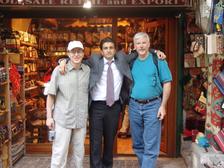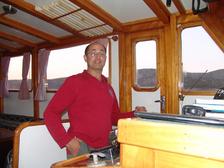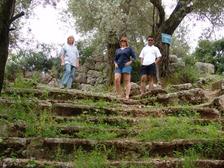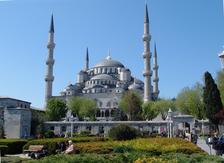Heading out on a new trip always has elements of familiarity, while at the same time there are always things that pop up to remind you to pay attention, because something new is likely to come along.
We are flying to Turkey for our 'R&R' trip, one of two that we get every year. Figuring out an R&R trip is always interesting - with only one official week of time, and most trips taking a travel day each way, it is a serious challenge to find a place to go that will actually give us a real break. In this case, Turkey is the only country we can fly to outside Kazakhstan in less than 4 hours, and for less than $1,000. Of course, it helps that we really like the place.
 We fly on a Tupelov 134, a fairly common Russian plane. They have always stuck me as a bit basic and unkempt - the plastic is a bit weathered, the toilet seats are made of wood, and the whole plane smells vaguely of oil and strong cleaner. We take business class, mainly because it gives us another 10 kilos of luggage. There isn't particularly more room, but the usual disinterested service seems a little less disinterested, and the drinks are served in real glasses. This flight is mainly used by the many Turkish contractors that come to Atyrau for high-paying jobs.
We fly on a Tupelov 134, a fairly common Russian plane. They have always stuck me as a bit basic and unkempt - the plastic is a bit weathered, the toilet seats are made of wood, and the whole plane smells vaguely of oil and strong cleaner. We take business class, mainly because it gives us another 10 kilos of luggage. There isn't particularly more room, but the usual disinterested service seems a little less disinterested, and the drinks are served in real glasses. This flight is mainly used by the many Turkish contractors that come to Atyrau for high-paying jobs.
Arrival in Turkey is like any of the hundreds of international airports in the world - the relative calm of the immigration and baggage claim area crumbles when you enter the chaotic terminal, with its crush of humanity, anxiously looking for that one traveler, looking somewhat disappointed that you are not that special person. Interspaced are the taxi drivers, waving signs. The traveler is tasked with quickly locating a sign that has their name, the name of the hotel, or something else that might in some way associate the traveler with a friendly receiver.
Driving from the airport in the complementary van, listening to the travel company representative, I am struck again with my ongoing dilemma about how I feel about Turks. Why are they so friendly? What do they want? What's in it for them? Can I trust them? As we follow our airport to hotel to hotel bar transition, we are barraged by one smiling Turk after another: the hotel manager, the travel company manager, the hotel owner (who also owns the conveniently located carpet shop), waiters, restaurant owners, etc., etc., etc. All are smiling, happy, and ready to go out of their way to help you in any way. I am never sure whether to fend off the attack, ignore them, or let the boy go for apple tea while one more carpet is unrolled on the stack in front of me.
As we follow our airport to hotel to hotel bar transition, we are barraged by one smiling Turk after another: the hotel manager, the travel company manager, the hotel owner (who also owns the conveniently located carpet shop), waiters, restaurant owners, etc., etc., etc. All are smiling, happy, and ready to go out of their way to help you in any way. I am never sure whether to fend off the attack, ignore them, or let the boy go for apple tea while one more carpet is unrolled on the stack in front of me.  I have told my friends, "Don't worry, they really are just very friendly". The truth is that I am never really sure myself. I definitely wouldn't say that about the guy who stopped us in the street, anxiously pointing at his shop, trying desperately to get a commitment for when "we'll come back later" really means. On the other hand, I really do think that the guy who wanted me to join him in his shop for a glass of wine really did just want a drinking companion. I guess I'll never know.
I have told my friends, "Don't worry, they really are just very friendly". The truth is that I am never really sure myself. I definitely wouldn't say that about the guy who stopped us in the street, anxiously pointing at his shop, trying desperately to get a commitment for when "we'll come back later" really means. On the other hand, I really do think that the guy who wanted me to join him in his shop for a glass of wine really did just want a drinking companion. I guess I'll never know.
It is quite clear that Turkey needs tourism, and it is clear that tourism has let Turkey down in the 3 years since the tragedy of 9/11. Still, there are plenty of tourists to go around, even though it is off season. German, Japanese, Dutch and Russian travelers don't seem to regard Turkey with the same sense of fear as Americans and British. Those Americans we do see are either hiding in the middle of a tour group, or are the hardened experienced types that seem almost appreciative that their fellow countrymen have been avoiding the place.
Generally, Turks are just nice people. The guy who stops me just to comment on my shoes ends up giving extensive directions to a man who does the best shoe repairs in town. If you ask someone for directions, more often as not they will just take you there. It is rare to hear people say anything bad about their country - Turks love Turkey.  Our boat captain/owner, Gokhan, is one of those Turks. He has a Welsh wife back in Cardiff, but just can't bring himself to stay there year round. So, he comes to Bodrum to charter his own boat to tourists and manage another boat for an Irish couple. He talks at length about how much he loves his home country, particularly the little stretch of shoreline around Bodrum. His crew of two has both been working on charter boats for upwards of 8 years, still seemingly amazed at their luck of having such cool jobs.
Our boat captain/owner, Gokhan, is one of those Turks. He has a Welsh wife back in Cardiff, but just can't bring himself to stay there year round. So, he comes to Bodrum to charter his own boat to tourists and manage another boat for an Irish couple. He talks at length about how much he loves his home country, particularly the little stretch of shoreline around Bodrum. His crew of two has both been working on charter boats for upwards of 8 years, still seemingly amazed at their luck of having such cool jobs. The Turkish coastline is littered with ruins from just about every part of history. We spend the night in a harbor famous for World War 2 sea battles, and motor over to an island once built up as a home for Cleopatra. As I climb the ancient stone seats of a small amphitheater, I wonder what it would've been like in those days, sitting on the seats watching the current equivalent of Three's Company. I stand on the steps, expansively reciting whatever I can remember of Julius Caesar. Instead of a cheering crowd and a nod from the Empress, I get "whatever" looks from my companions. I also wonder what it must be like to have grown up here in modern times, living in a country so steeped in history and so practiced in its role as the gatekeeper between the East and the West. I guess the one most important thing that Turks learn is balance - between cultures, between religions, and between modern times and their tumultuous past.
The Turkish coastline is littered with ruins from just about every part of history. We spend the night in a harbor famous for World War 2 sea battles, and motor over to an island once built up as a home for Cleopatra. As I climb the ancient stone seats of a small amphitheater, I wonder what it would've been like in those days, sitting on the seats watching the current equivalent of Three's Company. I stand on the steps, expansively reciting whatever I can remember of Julius Caesar. Instead of a cheering crowd and a nod from the Empress, I get "whatever" looks from my companions. I also wonder what it must be like to have grown up here in modern times, living in a country so steeped in history and so practiced in its role as the gatekeeper between the East and the West. I guess the one most important thing that Turks learn is balance - between cultures, between religions, and between modern times and their tumultuous past.
It seems unlikely that Turkey will be assimilated into the Borg-like European Union. Questions about population shift and religious affiliation aside, Euro-izing Turkey just seems like an insult to the blendered society that they have taken so long to perfect. We have ignored the tour guides' warnings that EU membership is a taboo subject and have asked opinions on the EU from just about everyone we have met. Opinions have generally been the same - if it happens it will be a long way off, probably after the USA and China join.  The famous Turkish hospitality is an excellent example of the sort of balance so common here. The Moslem attitude of helping everyone is perfectly tempered with the sort of tolerance not found in Arab countries. This results in a society that will not only give you the shirt off their backs, but will also buy the next round of Raki, the national, and very alcoholic, drink.
The famous Turkish hospitality is an excellent example of the sort of balance so common here. The Moslem attitude of helping everyone is perfectly tempered with the sort of tolerance not found in Arab countries. This results in a society that will not only give you the shirt off their backs, but will also buy the next round of Raki, the national, and very alcoholic, drink. I find that the more I learn about Muslims, the more I am surprised. Being raised a Southern Baptist in Middle America; my mental picture of Muslims was one of a man wearing a tablecloth on his head with a fully covered and very oppressed wife walking 5 steps behind. Both were undoubtedly carrying AK-47s under their dresses. The Muslims we have met in Turkey and Kazakhstan have been honest, generous people who are often anxious to help you understand the many similarities between Christianity and the Moslem faiths. Our tour guide in Istanbul took pains to point out that when Iya Sophia was converted from a church to a mosque, images of Mary with Jesus were protected because they too believe that the virgin birth, and the resurrection, was a God-sent miracle. Most of the damage to religious artifacts throughout Turkey was caused by souvenir-hunting Crusaders. I came away from the discussion wondering exactly what all the current fuss is about.
I find that the more I learn about Muslims, the more I am surprised. Being raised a Southern Baptist in Middle America; my mental picture of Muslims was one of a man wearing a tablecloth on his head with a fully covered and very oppressed wife walking 5 steps behind. Both were undoubtedly carrying AK-47s under their dresses. The Muslims we have met in Turkey and Kazakhstan have been honest, generous people who are often anxious to help you understand the many similarities between Christianity and the Moslem faiths. Our tour guide in Istanbul took pains to point out that when Iya Sophia was converted from a church to a mosque, images of Mary with Jesus were protected because they too believe that the virgin birth, and the resurrection, was a God-sent miracle. Most of the damage to religious artifacts throughout Turkey was caused by souvenir-hunting Crusaders. I came away from the discussion wondering exactly what all the current fuss is about. After re-reading this, I realize that my travel musings are more philosophy than travel guides. The truth is that giving detailed accounts of the expansive interior of the Blue Mosque, providing advice on how to deal with aggressive street vendors, or recommending the best Turkish restaurants is just not something I'm very good at. That is assuming I had a good enough memory, or took good enough notes, which I do neither. I travel for the people. Having a real or imaginary list to check off during travel just doesn't appeal to me. That doesn't mean I don't have a few things I would like to see and do when I can: Sign the logbook at Cape Horn, stick my nose in a few empty coves, explore a few backstreets. I've probably missed a few entries in 'One Thousand Things to See Before You Die'. I'm not worried.
After re-reading this, I realize that my travel musings are more philosophy than travel guides. The truth is that giving detailed accounts of the expansive interior of the Blue Mosque, providing advice on how to deal with aggressive street vendors, or recommending the best Turkish restaurants is just not something I'm very good at. That is assuming I had a good enough memory, or took good enough notes, which I do neither. I travel for the people. Having a real or imaginary list to check off during travel just doesn't appeal to me. That doesn't mean I don't have a few things I would like to see and do when I can: Sign the logbook at Cape Horn, stick my nose in a few empty coves, explore a few backstreets. I've probably missed a few entries in 'One Thousand Things to See Before You Die'. I'm not worried.
The trip is ending now, and just like the familiar beginning, the end has a somewhat deja vu feeling to it. Good trips feel long - this one certainly did. I find myself wondering how things changed at home, what new buildings were erected and how much warmer the weather must be now. Then I remember that this trip was only ten days. It seems like weeks.  We had a great time. In a short period we managed to meet some great new friends, do some major league relaxing, and see a few new things. I'm coming home with the obligatory carpets, which Liz is happy about - always important. As usual, I'm left feeling that I need to come back: to check out that one cove, forage in an unseen backstreet, and share that glass of tea with one of our new friends.
We had a great time. In a short period we managed to meet some great new friends, do some major league relaxing, and see a few new things. I'm coming home with the obligatory carpets, which Liz is happy about - always important. As usual, I'm left feeling that I need to come back: to check out that one cove, forage in an unseen backstreet, and share that glass of tea with one of our new friends.
I might even take in an historical monument or something.
Could happen.
